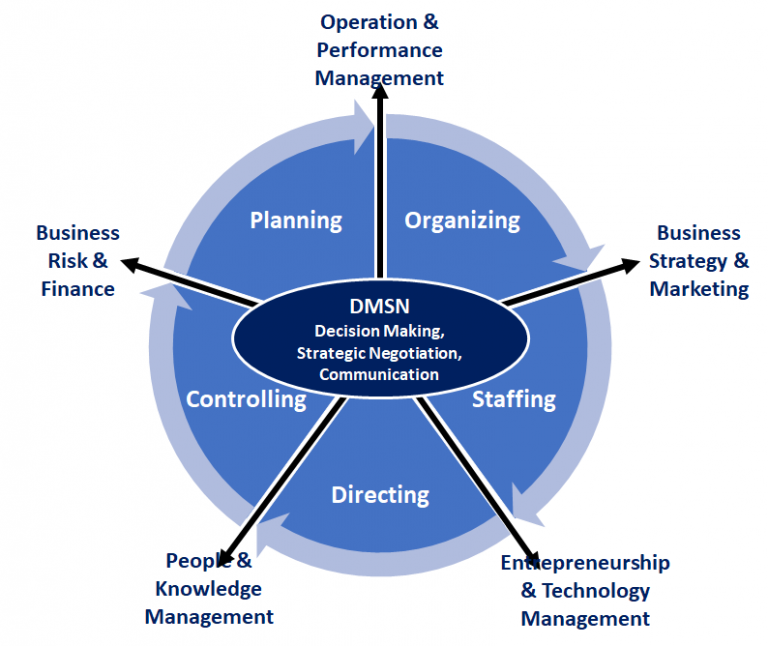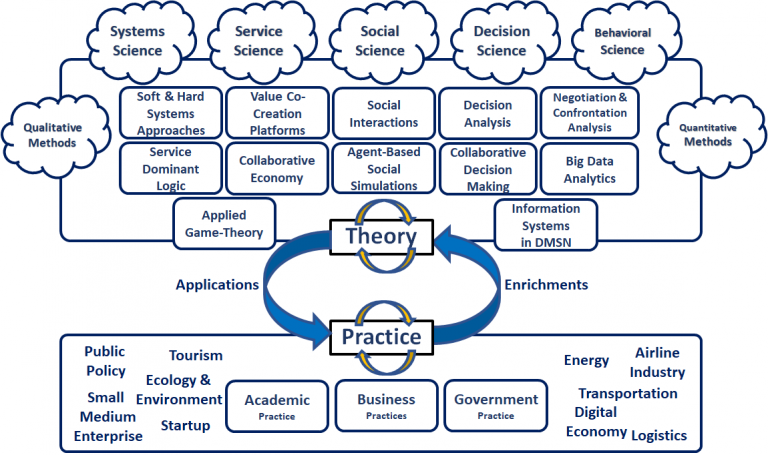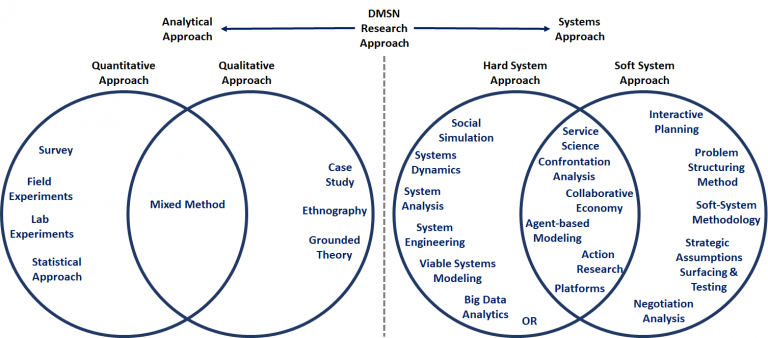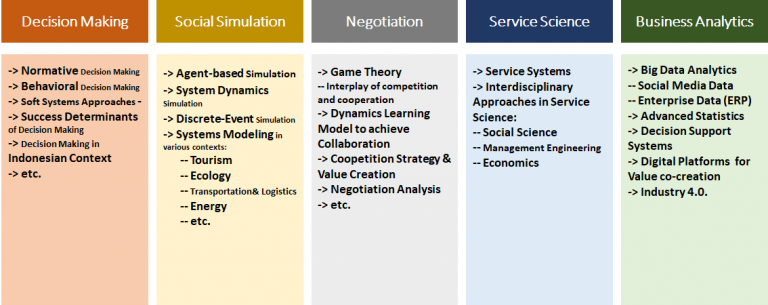
Figure 1. The Positioning of the Decision Making and Strategic Negotiation Group
Decision making is at the core of business and management activities. It is required in any management context (i.e. planning, organizing, staffing, directing, and controlling) and in any business function (e.g. operation, marketing, finance, human resource, etc.). As shown in Figure 1, in the School of Business and Management – ITB [SBM ITB], the Decision Making and Strategic Negotiation [DMSN] interest group focus on knowledge, skills, and research conducts on problem analysis, decision formulation, strategic negotiation, and decision communication in the business, management, and policymaking contexts. DMSN group views the conduct of making decisions, negotiations, and communications in all management contexts (i.e. planning, organizing, staffing, directing, and controlling) and business functions (e.g. operation, marketing, finance, human resource, etc.) using a holistic (non-siloed) perspective.
There is a gap between how the decision-making field is traditionally formulated (normative decision making) and the way people actually make decisions (descriptive decision making). The traditional view (i.e. the hard system approach) tends to view the decision-making field from a linear perspective. However, business and management issues are dealing with “soft” social systems where people behave autonomously according to their values and beliefs. DMSN interest group utilize and synthesize both hard and soft systems approaches (see Table 1) in defining, formulizing, and solving business and management decision-making issues. With the approach, more holistic, adaptive, flexible, and collaborative decision-making conducts can be achieved.
Table 1. Hard System and Soft System Approach in Decision Making
Hard Systems Approach
The decision-making problem and objective can be clearly defined. (often by an external stakeholder)
There is a consensus on the problem definition and the objective of the decision-making.
Top-down Planning.
People are considered as passive objects.
Future conditions are largely governed by today’s decisions. Decision making is considered as a static process.
Soft Systems Approach
Each stakeholder can have different perspectives on the exact definition of the decision-making problem and objective.
There are different perspectives and interests on the problem definition and the objective of the decision-making.
Bottom-up Planning.
People are considered as active objects.
Future conditions are full of dynamics and uncertainty and require open-ended decision making that can be updated as new information come.
The systems approach is one of the specialties of the DMSN interest group. It is selected since DMSN is interested in decision-making issues in real-life contexts. In such context, people involved behave in a unique behavior based on their internal properties such as culture, experience, motivation, and interest. Furthermore, these situations may involve negotiation conduct. This research direction is highly relevant in Indonesia that is comprised of people with different cultural backgrounds. Together with theoretical perspective from the service science, social science, decision science, and design science fields, DMSN explore myriad of research areas with a systems perspective. Some of the research areas are decision analysis, negotiation and confrontation analysis, value co-creation platforms, agent-based social simulations, service-dominant logic, soft system approaches, big data analytics, etc. The research explored in DMSN is aimed to be applicable in real-life practice. Concurrently real-life practices are the source of inspiration to enrich the existing theories/models. The overview of DMSN perspective in viewing the research and practice mutualism is portrayed in the following figure.

Figure 2. The Overview of Decision Making and Strategic Negotiation Research Map
Together with popular analytical research methods (e.g. quantitative, qualitative, and mixed research methods), the DMSN interest group also conducts research with methodologies known from the systems science domain. As shown in Figure 3, DMSN interest group conduct both hard and soft systems research approaches. Some of the systems methodologies employed in the DMSN interest group are soft systems methodology, total systems intervention, agent-based modeling, systems-dynamics modeling simulations, service science, big data analytics, etc.

Figure 3. The Research Approaches in the Decision Making and Strategic Negotiation Group
There are five big areas in which members of the Decision Making and Strategic Negotiation interest group conduct their teaching, research, and community services activities. As shown, the five areas are decision making, social simulation, negotiation, service science, and business analytics. The decision-making area involves fields such as normative decision making, systems approaches in decision making, etc. The social simulation area involves fields such as systems approaches, agent-based simulation, system dynamics simulation, discrete-event simulation, etc. The negotiation area involves fields such as game theory, the interplay of competition and cooperation, negotiation analysis, etc. The service science area involves fields such as service systems, interdisciplinary approaches in service-science, etc. The “Business Analytics” area involves fields such big-data analytics, advanced statistics, decision support systems, digital platforms for value creations, etc. Moreover these five research pillars are in line with the competencies that future businesses requires defined by the World Economic Forum such as complex problem solving, critical thinking, judgment and decision making in a VUCA (Volatile, Uncertain, Complex, Ambiguous) environment, negotiation, etc.

Figure 4. Five Expertise Pillars of the Decision Making and Strategic Negotiation Group
Community Service
DMSN interest group is actively contributing in providing community service, as one of the Three Pillars of Higher Education (Comprising Education, Research and Community Service). The community service is also one of the outlets of the research outputs which are in the scope of the research group roadmap. In the execution we collaborated with various stakeholders, such as a Government body, industry , community and even the direct society. “Workshop Pemanfaatan Digital Platform untuk Usaha Mikro di Pangandaran”, “Narasumber dalam K12 System Thinking di SMP Negeri 5 Surakarta”, “Social Capital among Womenpreneurs in Pangandaran di Pangandaran”, “Workshop on Soft System Methodology for Fintech Policy” are among of the latest community services that we have done this year. Below are some documentations of the activities and the community services under DMSN interest Group.
2019
- Seminar Tata Kelola Bisnis Kuliner di Taman Wisata Alam Gunung Papandayan di Garut
- Nara sumber pelatihan agent-based modeling dgn departemen Hubungan Internasional UNPAD
- Fasilitator pada kegiatan Training on Mind Mapping and Analytical Hierarchy Method
- Juri kegiatan Kesadaran tentang Efisiensi Energi dan Konsekuensi Energi di Sektor Pendidikan di Bandung – Jawa Barat, termasuk Lomba Hemat Energi
- Narasumber Sosialisai untuk Perubahan Perilaku Anak dalam Keputusan Membuang Sampah di SD Tunas Unggul
- Trainer Community Service: Workshop on Marketing Analytics di Garut
- Social Capital among Womanpreneurs in Pangandaran di Pangandaran
- Narasumber dalam Smart City with Smart Traffic: Enhancing Public Transportation Users’ Experience with Technologies
- Fasilitator dalam kegiatan Big Data, Business Intelligence, and Business Analytics for Non-IT Executives
- Workshop K12 System Thinking di SMP Negeri 5 Surakarta
- Workshop Knowledge Management Awareness di Puslitbang Sumber Daya Air
- Kegiatan Knowledge Management Awareness di Lingkungan Badan pengembangan infrastruktur Wilayah di Atria Gading Hotel Serpong
- Fasilitator pembahasan Facet Teknologi knowledge Manajemen dan penyusunan strategi serta indikator keberhasilan knowledge management di Puslit jalan dan jembatan
- Fasilitator pada FGD dengan Disparbud, Bappeda, dan Humas Kab. Pangandaran di Kantor Disparbud Pangandaran
- Fasilitator untuk menghadiri Knowledge Management Awareness di Ruang Rapat Balai Irigasi, Bekasi
- Fasilitator pada workshop science based policy making for BIN
- Fasilitator pada Workshop on Mind Map and Multi Criteria Decision Making using Analytical Hierarchy Process
- Pengajar/fasilitator Problem solving and negotiation dalam program Mini MBA in Property
- Narasumber dalam The Role of Data-driven Information Systems (Business Intelligence & Analytics) to increase Business Performance
- Narasumber dalam Research Methods in Digital Industry
- Fasilitator pada Workshop Kebijakan Pertanian dengan Agent-Based Modeling untuk Badan Litbang Departemen Pertanian Republik Indonesia
2014
- Narasumber dan Moderator Forum Knowledge Sharing (FKS) tentang Peran Litbang ESDM dalam Membangun Ekonomi Berbasis Pengetahuan
- Narasumber dan Panitia dalam Pelatihan Knowledge-Based Project Management di Lingkungan Litbang ESDM di The Travel Hotel Cipaganti Setiabudi Bandung.
Selected Publications
Continuity Decision in Strategic Alliances of Technology Development Stages. (2020). (Best Paper in for “Information system, technology management, and social science” category)
Sani, K., Siallagan, M., Putro, U. S., & Mangkusubroto, K. (2018). Indonesia energy mix modelling using system dynamics. International Journal of Sustainable Energy Planning and Management, 18, 29-51.
Innovation success over time of alliances with different strategic and cooperation objectives. In Modeling and Simulation Techniques for Improved Business Processes (2018) (pp. 1-23). IGI Global.” (Book Chapter )
Siallagan, M., Martono, N. P., & Putro, U. S. (2017). Agent-Based Simulations of Smallholder Decision-Making in Land Use Change/Cover (LUCC) Problem. In Agent-Based Approaches in Economics and Social Complex Systems IX (pp. 97-107). Springer, Singapore.
Wasesa, M., Stam, A., & van Heck, E. (2017). The seaport service rate prediction system: Using drayage truck trajectory data to predict seaport service rates. Decision Support Systems, 95, 37-48.
Wasesa, M., Stam, A., & van Heck, E. (2017). Investigating agent-based inter-organizational systems and business network performance: Lessons learned from the logistics sector. Journal of Enterprise Information Management, 30(2), 226-243.
Mangkusubroto, K., Putro, U. S., Novani, S., & Kijima, K. (Eds.). (2016). Systems Science for Complex Policy Making: A Study of Indonesia (Vol. 3). Springer.
Hermawan, P., & Yoshanti, G. (2016). Unfolding the problem of Batik waste pollution in Jenes River, Surakarta, using critical system heuristics and drama-theoretic dilemma analysis. In Systems Science for Complex Policy Making (pp. 93-108). Springer, Tokyo.
Nuraeni, S., Arru, A. P., & Novani, S. (2015). Understanding consumer decision-making in tourism sector: conjoint analysis. Procedia-Social and Behavioral Sciences, 169, 312-317.
Mayangsari, L., Novani, S., & Hermawan, P. (2015). Understanding a viable value co-creation model for a sustainable entrepreneurial system: a case study of Batik Solo industrial cluster. International Journal of Entrepreneurship and Small Business, 26(4), 416-434.
Bintoro, B. P. K., Simatupang, T. M., Putro, U. S., & Hermawan, P. (2015). Actors’ interaction in the ERP implementation literature. Business Process Management Journal, 21(2), 222-249.
Ariyanto, K. (2014). Analyzing the Conflict between Football Organizations in Indonesia. Procedia-Social and Behavioral Sciences, 115, 430-435.
Novani, Santi, and Kyoichi Kijima. “Efficiency and effectiveness of C2C interactions and mutual learning for value co-creation: Agent-based simulation approach.” International Journal of Business and Management 8.9 (2013): 50.
Sunitiyoso, Y., Avineri, E., & Chatterjee, K. (2013). Dynamic modelling of travellers’ social interactions and social learning. Journal of Transport Geography, 31, 258-266.
Novani, S., & Kijima, K. (2012). Value co-creation by customer-to-customer communication: Social media and face-to-face for case of airline service selection. Journal of Service Science and Management, 5(1), 101-109.
Sunitiyoso, Y., Avineri, E., & Chatterjee, K. (2011). The effect of social interactions on travel behaviour: An exploratory study using a laboratory experiment. Transportation Research Part A: Policy and Practice, 45(4), 332-344.
Hermawan, P., & Kijima, K. (2009). Conflict analysis of Citarum River Basin pollution in Indonesia: A drama-theoretic model. Journal of Systems Science and Systems Engineering, 18(1), 16-37.
Sunitiyoso, Y., & Matsumoto, S. (2009). Modelling a social dilemma of mode choice based on commuters’ expectations and social learning. European Journal of Operational Research, 193(3), 904-914.
Putro, U. S., Novani, S., Siallagan, M., Deguchi, H., Kantani, Y., Kaneda, T., … & Tanuma, H. (2008). Searching for effective policies to prevent bird flu pandemic in Bandung city using agent‐based simulation. Systems Research and Behavioral Science, 25(5), 663-673.
Putro, U. S., Kijima, K., & Takahashi, S. (2000). Adaptive learning of hypergame situations using a genetic algorithm. IEEE Transactions on Systems, Man, and Cybernetics-Part A: Systems and Humans, 30(5), 562-572.
Members
Head: Yos Sunitiyoso, ST., M ENG., Ph.D
Arfenia Nita, ST., MMgt (Fin)
Khrisna Ariyanto, ST., MT., M.Eng., Ph.D
Prof. Dr. Ir. Kuntoro Mangkusubroto, MSIE., MSCE.
Lidia Mayangsari, S.Si., MSM., M.Eng
Manahan Siallagan, S.Si, MT, M.Sc, Dr. Eng
Meditya Wasesa, Ph.D
Dr. Eng. Pri Hermawan, S.T., M.T.
Santi Novani, S.Si, MT, Ph.D
Shimaditya Nuraeni S.Psi, MSM
Prof. Dr. Utomo Sarjono Putro, M.Eng



